 MyCatBreeds
MyCatBreeds Tonkinese is originated from Canada but German Rex is originated from Germany. Both Tonkinese and German Rex are of same weight. Both Tonkinese and German Rex has almost same life span. Both Tonkinese and German Rex has same litter size. Tonkinese requires Moderate maintenance. But German Rex requires Low maintenance
Tonkinese is originated from Canada but German Rex is originated from Germany. Both Tonkinese and German Rex are of same weight. Both Tonkinese and German Rex has almost same life span. Both Tonkinese and German Rex has same litter size. Tonkinese requires Moderate maintenance. But German Rex requires Low maintenance
 It was about in 1960 that a breeding program was established for these cats. The Tonkinese is a cat that hails from Canada and it was a certain Jane Batlett who was responsible for breeding this cat.
It was about in 1960 that a breeding program was established for these cats. The Tonkinese is a cat that hails from Canada and it was a certain Jane Batlett who was responsible for breeding this cat.
Also, Margaret Conroy, another breeder, set up her breeding program between a Burmese female with a Siamese. Both Conroy and Bartlett worked together on the breed and the Tonkinese came about. The Cat Fanciers Association recognized this cat breed in 1984.
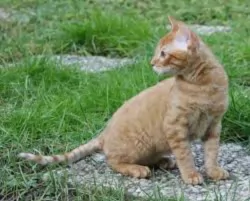 The cat originates from Germany and was developed in about the 1950s. Dr. Rose Scheuer-Karpin found a frizzy-haired black and white cat and chose to breed her.
The cat originates from Germany and was developed in about the 1950s. Dr. Rose Scheuer-Karpin found a frizzy-haired black and white cat and chose to breed her.
So as to fix the frizzy hair gene, it was decided to mate the cat further and this was the start of the German Rex.
It was later crossed with the Cornish Rex. The cats were recognized by the International Feline Foundation, but the Cat Fanciers' Association still associates the breed with the Cornish Rex.
 As a medium-sized cat, with a firm, muscular body, your Tonkinese will weigh between 2.5 – 6kg.The head is slightly rounded with fairly broad ears that are set wide apart.
As a medium-sized cat, with a firm, muscular body, your Tonkinese will weigh between 2.5 – 6kg.The head is slightly rounded with fairly broad ears that are set wide apart.
The eyes are bigger than the classic Oriental shape and can range from green to light blue in color.
The coat of the Tonkinese is short and close-lying and is soft and silky to touch. The mask, the ears, legs and tail are all darker than the body.
The Tonkinese cat breed is recognized by the Cat Fanciers' Association in 4 base colors - medium brown, champagne, blue and and platinum.
The Tonkinese cat, with one of its parents being the Siamese cat, just loves giving and receiving attention.
Active and social, he is an excellent choice for families with children and even other pets. They love just seeking out their human companions and lying down where they are.
They’re intelligent felines these, and you can even teach them some simple commands. Because of them being so very social, they don’t like to be left on their own – certainly not for the whole day while you go off to work.
 This is a medium-sized, muscular domestic cat with a well-developed chest. The cat can weigh between 3 and 6kg.
This is a medium-sized, muscular domestic cat with a well-developed chest. The cat can weigh between 3 and 6kg.
The legs are fairly long and slender but strong and the tail is thick and furry with a rounded tip. The head is round and the ears are large. The eye colors are always related to the coat color. The coat is short and silky and in many colors and it has a tendency to curl.
These are friendly cats that form a strong bond with their human owners, although they are friendly towards strangers too.
They’re intelligent, lively, and playful too and will fit in well to homes with children.
Because of their playful nature, you want to ensure you provide them with lots of entertaining, stimulating toys.
They’ve got balanced personalities and are known for being sociable, adapting to the lifestyles they find themselves in. They will also get on well with other pets in the home, and enjoy being both indoors and outside.
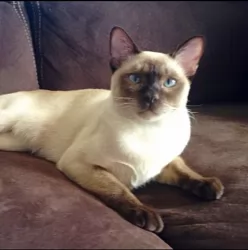 Tonkinese cats can be active and highly entertaining with their antics. When you laugh at them, they are encouraged to perform more.
Tonkinese cats can be active and highly entertaining with their antics. When you laugh at them, they are encouraged to perform more.
They are affectionate and intelligent cats and you will need to have toys for him. When he isn't playing, he likes nothing more than to be petted and pampered by his human family.
Your Tonkinese will get on well with children and other pets, and he generally makes a splendid pet for those who care well for him.
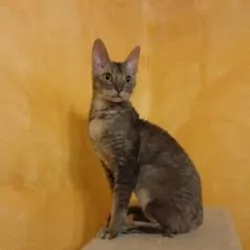 Your German Rex is everything you want in a pet. He is a cat that loves his human family and is prepared to offer loyalty and love in exchange for the same.
Your German Rex is everything you want in a pet. He is a cat that loves his human family and is prepared to offer loyalty and love in exchange for the same.
He is adaptable and undemanding. Before you invest in such a cat, understand that interaction from you is highly important, so if you don’t have time for an adult pet, it would be kinder not to get this particular cat breed as they crave lots of attention,
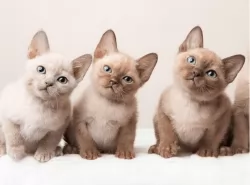 Tonkinese are generally healthy cats but they can be prone to eye problems such as gingvitis.
Tonkinese are generally healthy cats but they can be prone to eye problems such as gingvitis.
Because they are part of the Siamese family, they can succumb to some of the diseases that the Siamese battles with. These are asthma/bronchial disease, heart defects, lymphoma, and crossed eyes.
Lymphoma is linked with feline leukemia, a viral infection, and thankfully, more cats are being vaccinated for feline leukemia, so fortunately it is becoming less common.
Intestinal lymphoma affects the gastrointestinal tract and is the most common type of lymphoma in cats, being more common in older cats. Affected cats can suffer with weight loss, vomiting, and diarrhea. Get your cat to the vet as diagnosing this lymphoma will require the vet finding cancerous cells on microscopic examination.
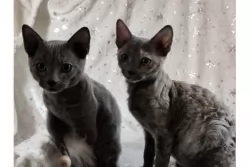 With excellent care and lots of love and attention, your German Rex can reach up to 17 years of age. They aren’t prone to any particular diseases, but diet plays a massive role in their health.
With excellent care and lots of love and attention, your German Rex can reach up to 17 years of age. They aren’t prone to any particular diseases, but diet plays a massive role in their health.
Remember that obesity is a major disease and it in itself can contribute to a host of other illnesses in cats and shorten its life. Excess weight contributes towards arthritis and diabetes and just losing a bit of weight can contribute towards increased mobility.
Dental disease is a common, chronic problem and you need to ensure your pet’s diet promotes dental health. It can be extremely stressful for your cat to have his teeth brushed, but in the case of chronic dental infection, get your pet to a vet.
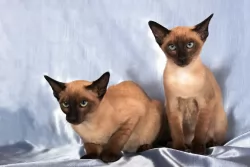 The Tonkinese has a short coat so a brush once a week will be sufficient for this cat as it just helps to brush away dust and loose hairs.
The Tonkinese has a short coat so a brush once a week will be sufficient for this cat as it just helps to brush away dust and loose hairs.
He will need a litter box and this will need to be kept spotlessly clean. Use a small rake, available from your vet or local pet shop, to rake up the cat’s feces.
When you first bring your Tonkinese cat home, you will at least need some of the basics to ensure his wellbeing. These are -
sleeping equipment – baskets or cushions in a nice warm, dry place for your cat.
A cat tree for climbing and a scratching post. Cats are natural scratchers so you can’t get angry with your cat for scratching. Instead, invest in a scratching post so that he doesn’t use your furniture to scratch on.
Food is such an important part of caring for a cat. The best type of cat food can ensure your cat has a strong immune system that allows him to not succumb to every cat sickness there is.
Cats are carnivores so ensure he has food high in meat. Sometimes it can be costly, but try to provide your cat with the best, most high-quality cat foods there are to ensure his good health and happiness.
A cat needs a constant supply of fresh, cool water night and day. The water should be changed regularly.
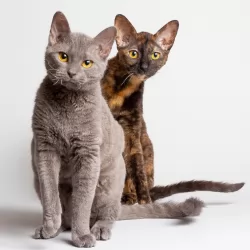 The German Rex is a shorthaired breed so a gentle brush once a week will be quite adequate.
The German Rex is a shorthaired breed so a gentle brush once a week will be quite adequate.
As you groom your German Rex, feel for any unusual lumps and make sure there are no signs of sores or rashes on your cat.
Check inside his ears for wax and dirt buildup and signs of redness for infection. If you don’t like to clean the inside of your cat’s ears, there are professional cat groomers and your local vet who will do this for you.
Make sure you feed your Rex the best cat food there is. When you look at the commercially cat manufactured foods there are, you’ll notice that there is dry kibble for cats as well as wet-type foods.
Through trial and error, you’ll learn what your cat likes, but your vet can offer valuable information on what is essential in a cat’s diet. Cats are carnivores so that means their diets have to be high in meat – protein – and low in carbohydrates.
Check out the best cat foods there are – the ones that have all the vitamins and minerals your cat requires to remain healthy.
Provide your cat with a litter box and keep it meticulously clean, scooping out the cat droppings every day and changing the actual sand or grit regularly.
Provide your cat with a warm bed, food and water bowls, toys, collar, and tag, climbing tree and scratching post.
Your kitten must start their first vaccines between 8 and 12 weeks of age. Your kitten will also be dewormed.
Take your cat to the vet when he is sick.